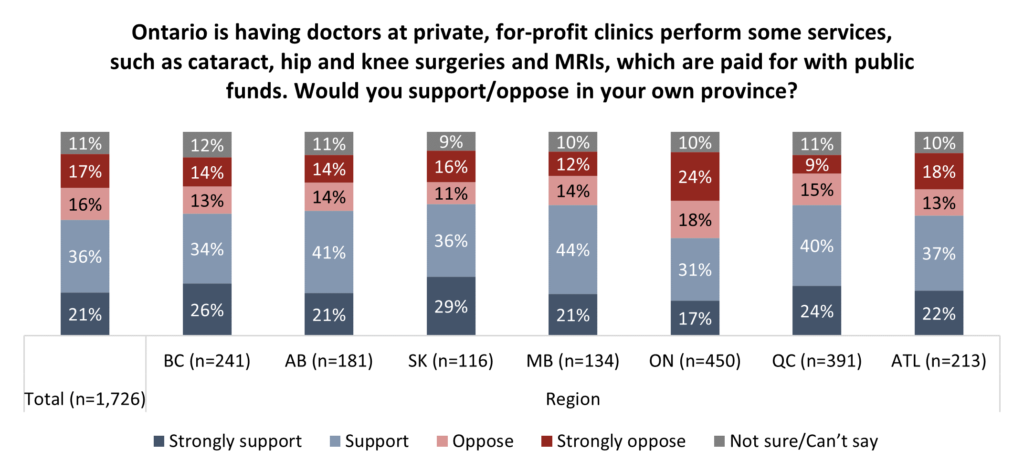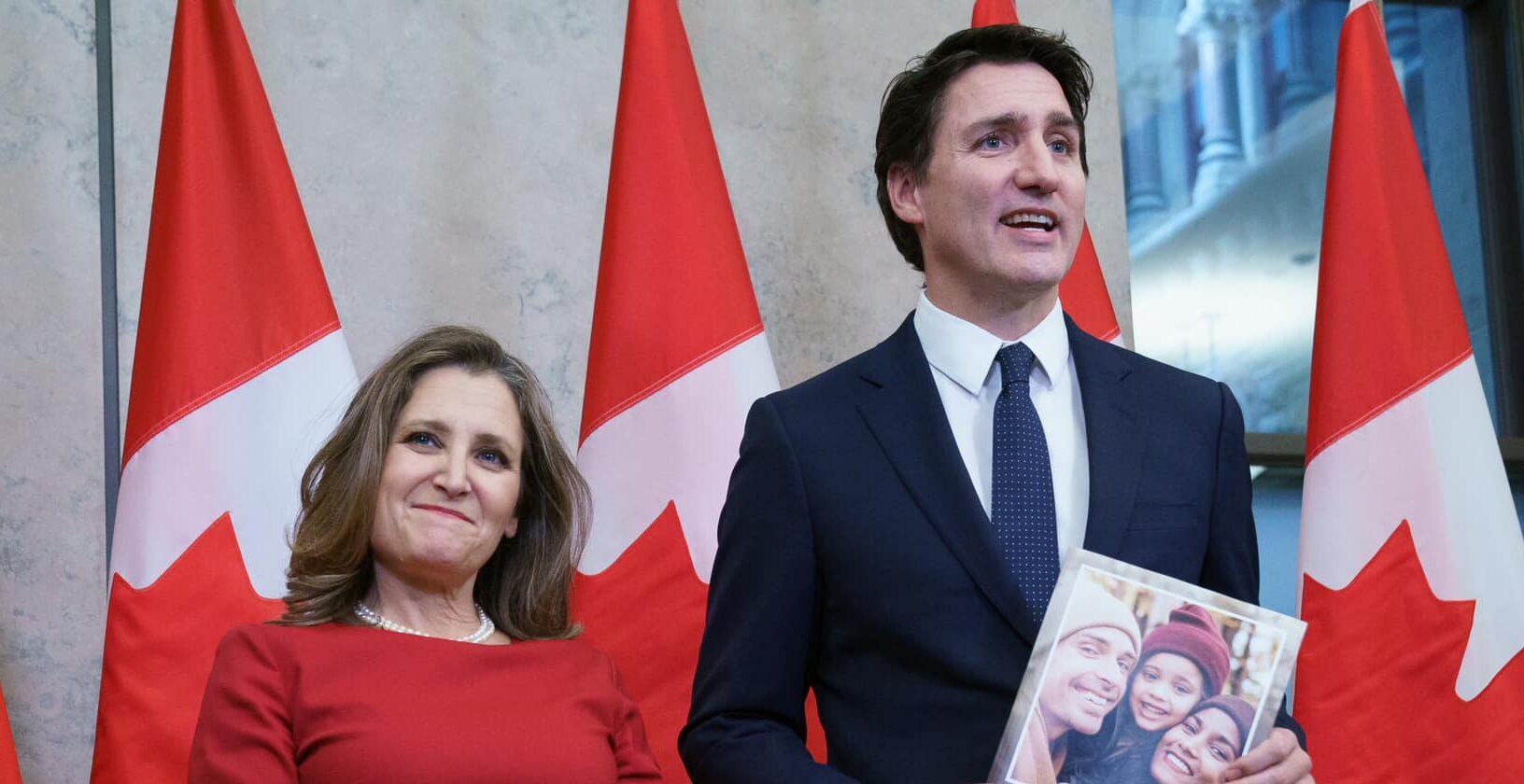Ontario plan to pay for private operations with public funds draws support from majority
February 6, 2023 – With Canada’s first ministers set to meet tomorrow in an attempt to hammer out a health care accord aimed at healing an objectively broken health care system, new data from the non-profit Angus Reid Institute finds Canadian public opinion divided over key decision points.
As the federal government seeks changes including system and reporting reforms from provinces as a condition of increased funding, two-in-five (41%) say that it is right to do so. However, a similar number (44%), say the individual provinces should receive additional funding to improve health care delivery without strings attached.
Many Canadians trust their own province to handle delivery without these reforms. Indeed, residents in B.C., Alberta, Saskatchewan, Manitoba, and Quebec are all more likely to say their province should receive the funding now and without conditions. The loudest voice in opposition to this is in Ontario, the only region of the country where a majority (54%) say the federal government should receive commitments from the province in order to access additional funding.
This, after Premier Doug Ford and his Progressive Conservative government announced plans to move some procedures, including cataract, hip and knee surgeries to private clinics and pay for the operations using public funds. While this may be frustrating some, including the official opposition, support for the plan approaches half (48%) in Ontario, and exceeds majority in every other region of the country (respondents were asked about the acceptability of this type of plan in their own province).
All of this creates an additional layer of intrigue ahead of meetings this week between federal and provincial government officials.
More Key Findings: 
- Ontario’s decision to shift some surgeries to private clinics is popular among past Conservative voters – seven-in-ten (72%) would support this in their own province. Past Liberals lean slightly toward support (51% to 40%) while past NDP voters push back, with 55 per cent voicing opposition.
- The number of Canadians reporting poor health care where they live has risen seven points since August, from 61 to 68 per cent. This is reported as worst in Atlantic Canada where half (51%) say health care is in crisis where they live and another one-in-three say it is poor (33%).
- Those who assess care in their community as poor are most likely to say both levels of government share blame (45%), though 39 per cent blame primarily their provincial government, far more than blame solely the federal government (12%)
About ARI
The Angus Reid Institute (ARI) was founded in October 2014 by pollster and sociologist, Dr. Angus Reid. ARI is a national, not-for-profit, non-partisan public opinion research foundation established to advance education by commissioning, conducting and disseminating to the public accessible and impartial statistical data, research and policy analysis on economics, political science, philanthropy, public administration, domestic and international affairs and other socio-economic issues of importance to Canada and its world.
INDEX:
-
Two-thirds now say health care where they live is poor
-
Canadians see both levels of government sharing blame for poor care
-
Canadians divided about federal demand for reform
-
Ontario plan to offload care to third parties draws support
Two-thirds now say health care where they live is poor
Canada’s health care system has faced immense challenges over the past three years. The country is dealing with a shortage of family doctors, while more than half of doctors themselves report burnout. Consequently, many Canadians struggle with poor access and inadequate care. In the face of a search for answers, and meetings between the federal government and its provincial counterparts to discuss the issue, it appears that the trend is only worsening.
Three-in-ten Canadians (30%) say that the state of health care where they live is in crisis – up five points from last summer. Overall, the number reporting poor or very poor care in their community has risen seven points over the past six months:

The situation is reported to be worst by respondents in Atlantic Canada, where staffing shortages in both urban and rural parts of the region have residents waiting for care longer than anywhere else in the country. At least three-in-five residents in every region of Canada report care as poor or very poor where they live:

Canadians see both levels of government sharing blame for poor care
The blame game is a popular one when it comes to Canadian health care. Premiers released a statement after two days of negotiations in November calling discussions “a failure”, while Prime Minister Trudeau resisted planning a sit down with provincial leaders until agreements on “reforms” were conceded by the provinces.
For Canadians, there is plenty of blame to go around. Indeed, the largest group – 45 per cent – say that their poor care is attributable to failures by both the federal and provincial governments. That said, likely noting that health care is under provincial jurisdiction, two-in-five (39%) blame solely their own province, including half (51%) in Alberta. This far outpaces the number who say the federal government is primarily to blame (12%):

*smaller sample size, interpret with caution
The federal Liberal government is a more popular target for blame among those who supported the Conservative Party in the 2021 election. Here, one-quarter (26%) say Trudeau and company shoulder most of the blame. A majority of past Liberal and NDP voters point their finger at the provinces:

Canadians divided about federal demand for reform
The federal government has requested that provinces meet certain conditions in order to receive an increase in health care transfers. In initial discussions the provinces noted that they would like Ottawa to increase funding to cover 35 per cent of health-care costs, a significant boost from the current 22 per cent. While negotiations will continue this week, the federal government has requested changes to health care reporting, something Alberta Premier Danielle Smith described as acceptable, even if not ideal.
Similar numbers of Canadians take each side of this debate over reforms. Slightly more than two-in-five (44%) say that health funding should be unconditional, while two-in-five (41%) disagree and say the federal government is right to demand reforms, even if it holds up a deal. Perhaps most notable in these data are the responses from Ontarians. Here, a majority say they support federal strings attached to funding, the only region of the country where residents hold that view at such a high level. This, as Premier Doug Ford prepares legislation to allow for more surgeries to occur at private clinics, while still being paid for with public health funds:

Past Conservative and Bloc Quebecois voters ally heavily with the provinces on this debate, while past NDP and Liberal supporters lean the other direction:

Ontario plan to offload care to third parties draws support
The decision to offload public procedures into the already existing private network in Ontario has been described as privatization by critics including the official opposition. That does not, however, mean that the idea is unpopular. In Ontario, more residents support (48%) than oppose (42%) it, while in the rest of the country, asked about the same concept for their own province, at least three-in-five in every region say they would support it:

The concept of increasing private delivery of procedures as long as it is paid for by public funds is popular with past Conservative and BQ voters, as well as half of Trudeau’s own supporters. Those who supported the NDP in 2021 push back, with two-thirds (65%) opposing the concept for their own province:

Survey Methdology:
| The Angus Reid Institute conducted an online survey from February 1 – 3, 2023 among a representative randomized sample of 1,726 Canadian adults who are members of Angus Reid Forum. For comparison purposes only, a probability sample of this size would carry a margin of error of +/- 2.5 percentage points, 19 times out of 20. Discrepancies in or between totals are due to rounding. The survey was self-commissioned and paid for by ARI. Detailed tables are found at the end of this release. |
For detailed results by age, gender, region, education, and other demographics, click here.
To read the full report, including detailed tables and methodology, click here.
To read the questionnaire in English and French, click here.
Image – Province of British Columbia/Flickr
MEDIA CONTACT:
Shachi Kurl, President: 604.908.1693 shachi.kurl@angusreid.org @shachikurl
Dave Korzinski, Research Director: 250.899.0821 dave.korzinski@angusreid.org



